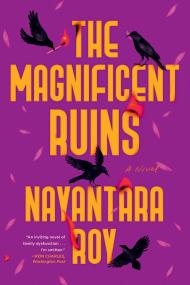By clicking “Accept,” you agree to the use of cookies and similar technologies on your device as set forth in our Cookie Policy and our Privacy Policy. Please note that certain cookies are essential for this website to function properly and do not require user consent to be deployed.
Honor
Contributors
Formats and Prices
- On Sale
- Jan 4, 2022
- Page Count
- 336 pages
- Publisher
- Algonquin Books
- ISBN-13
- 9781643752174
Prices
- Sale Price $2.99
- Regular Price $13.99
- Discount (79% off)
Prices
- Sale Price $2.99 CAD
- Regular Price $17.99 CAD
- Discount (83% off)
Format
Format:
- ebook $2.99 $2.99 CAD
- Audiobook Download (Unabridged) $27.99
- Trade Paperback $18.99 $24.99 CAD
This item is a preorder. Your payment method will be charged immediately, and the product is expected to ship on or around January 4, 2022. This date is subject to change due to shipping delays beyond our control.
Buy from Other Retailers:
“In the way A Thousand Splendid Suns told of Afghanistan’s women, Thrity Umrigar tells a story of India with the intimacy of one who knows the many facets of a land both modern and ancient, awash in contradictions.” —Lisa Wingate, #1 New York Times bestselling author of Before We Were Yours
In this riveting and immersive novel, bestselling author Thrity Umrigar tells the story of two couples and the sometimes dangerous and heartbreaking challenges of love across a cultural divide.
Indian American journalist Smita has returned to India to cover a story, but reluctantly: long ago she and her family left the country with no intention of ever coming back. As she follows the case of Meena—a Hindu woman attacked by members of her own village and her own family for marrying a Muslim man—Smita comes face to face with a society where tradition carries more weight than one’s own heart, and a story that threatens to unearth the painful secrets of Smita’s own past. While Meena’s fate hangs in the balance, Smita tries in every way she can to right the scales. She also finds herself increasingly drawn to Mohan, an Indian man she meets while on assignment. But the dual love stories of Honor are as different as the cultures of Meena and Smita themselves: Smita realizes she has the freedom to enter into a casual affair, knowing she can decide later how much it means to her.
In this tender and evocative novel about love, hope, familial devotion, betrayal, and sacrifice, Thrity Umrigar shows us two courageous women trying to navigate how to be true to their homelands and themselves at the same time.
Genre:
-
“Honor is an utterly engrossing novel about two very different women whose lives converge after an unspeakable act of violence in India. With insight and compassion, Thrity Umrigar writes masterfully about the complexities of hatred and love, estrangement and belonging, oppression and privilege, about holding on and letting go. A powerful, important, unforgettable book.”
—Cheryl Strayed, #1 New York Times bestselling author of Wild
“In the way A Thousand Splendid Suns told of Afghanistan’s women, Thrity Umrigar tells a story of India with the intimacy of one who knows the many facets of a land both modern and ancient, awash in contradictions, permeated by a smoldering mix of ageless traditions and new ideas, beauty and brutality, hope and despair, certainty and mystery. A place where love can sometimes involve the peril of defying convention . . . and ultimately risking everything for what matters most.”
—Lisa Wingate, #1 New York Times bestselling author of Before We Were Yours
“Honor is a novel of profound depths—cultural, personal, romantic, spiritual. It’s also a story of tremendous grace, both in the understanding it shows its characters and in the ways they navigate a brutal but stunning life.”
—Rebecca Makkai, Pulitzer Prize finalist for The Great Believers
“Honor by Thrity Umrigar is about an Indian-American journalist named Smita who returns to India on assignment. The story she’s covering is an emotionally riddled one that utilizes the lives of characters to portray the cultural realities of India, both new and old. Her experiences lift the veil on the complexities of journalism and leave Smita questioning her boundaries as a reporter. Complex and unfiltered, these are the type of characters that stick with you long after you turn the pages . . . Powerful story about family, devotion, and cultural truths all through the eyes of an incredible journalist.”
—Reese Witherspoon, the January 2022 Reese’s Book Club Pick
“Umrigar aptly tackles honor killings in rural India and paints Meena with agency and depth . . . Honor boldly examines a system that continues to greenlight brutality and serves as a poignant reminder that despite all odds, ‘in every country, in every crisis, there are a handful of people who will stand against the tide.' ”
—Minneapolis Star Tribune
“Umrigar’s strength as a writer is most potent in individual scenes that distill these tensions. Just as the arc of the story builds to a crescendo, both in its hastening action surrounding the trial of Meena’s brothers and the reader’s understanding of Smita’s history, so do smaller moments . . . The many layers that comprise Honor unfurl like a peak season peony.”
—The Boston Globe
“Umrigar’s latest novel is a transformative tale of privilege, extremism and heartbreak.”
—The New York Times Book Review
“Thrity Umrigar’s novel offers a well-rounded portrait of India . . . Whether she’s writing about the bright lights of Mumbai or the poverty of village life, Umrigar excels at creating engaging situations and scenes. Readers will appreciate this novel’s deep understanding of the many complexities of Indian society.”
—BookPage
“Propulsive . . . Umrigar offers readers a broad understanding of the complicated issues at play in contemporary India.”
—Publishers Weekly
“The kind of book that makes me want to sit for hours and read… Powerful and poignant.”
—Southern Bookseller Review
“Full-bodied and insightful, Honor is both a page-turning account of a horrific family drama and a meditation on the complexities of love—both personal and national.”
—Shelf Awareness
“Umrigar excels in her juxtaposition of the contrasts between the tech hub image of contemporary India and the deep religious divisions that continue to wrack rural regions . . . This is a thought-provoking portrait of an India that ‘felt inexpressibly large—as well as small and provincial enough to choke.’”
—Booklist
“Thrity navigates readers between hate and love, and the things that divide us as much as those that bring us together. It’s one of those novels that will spur lots of conversation as we look at the oppression of women in many different settings, and the conflicts that religious beliefs can bring, even today. Book groups, there is a lot to unpack here.”
—BookReporter
“A powerful story of love and connection centered in a world of divisive cultural issues.”
—Cleveland Magazine
“A tender and evocative novel about love, hope, familial devotion, betrayal, and sacrifice.”
—BookClubs.com
“With Honor, Thrity Umrigar continues her habit of laying bare the folly of our perceived differences. This is an intense and spellbinding novel, ricocheting between fear and hope, betrayal and redemption. It is the story of the human heart in all its complexities, and love worth fighting for.”
—Connie Schultz, bestselling author of The Daughters of Erietown -
“As with all of Thrity Umrigar’s stories, this novel examines nuances of race, caste, and class with stark honesty, and though the crimes are difficult to stomach, they reflect reality. This story of an Americanized Indian woman reconciling with India’s entrenched race conflicts does not disappoint.”Zibby Mag
Newsletter Signup
By clicking ‘Sign Up,’ I acknowledge that I have read and agree to Hachette Book Group’s Privacy Policy and Terms of Use







